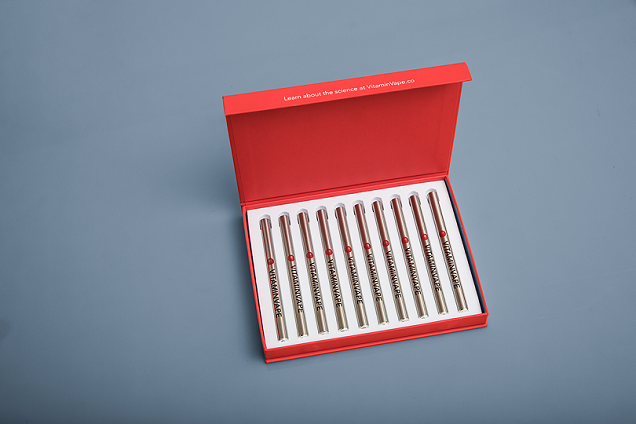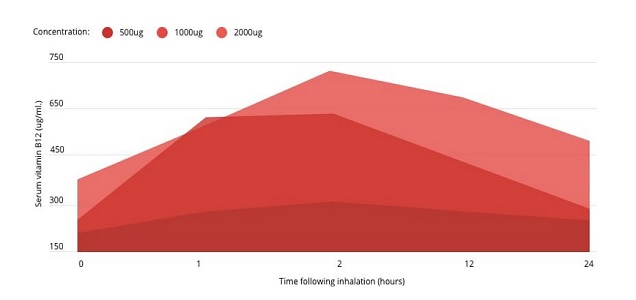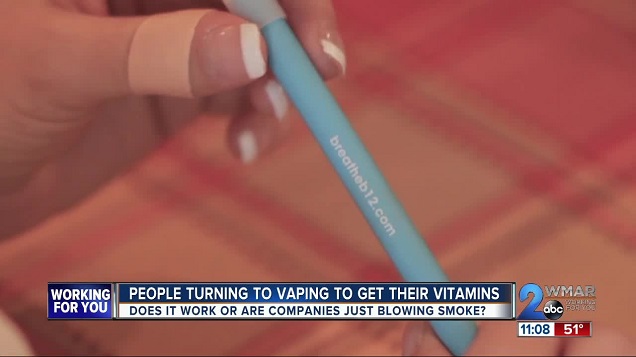
As vaping nicotine has become increasingly popular, many companies have tried to cash in by putting other substances in your juice.
Vapers have likely heard about the probably pointless practice of vaping caffeine or even the various problems with vaping chilies, but people are still searching for new, similar uses for the standard vape pen. One idea that’s gained traction recently is vaping vitamins. The idea seems straightforward enough: you can get your vitamins by inhaling them instead of planning your diet or taking supplements. But there is a lot of reason to be skeptical about the idea. Will it really work? Is it safe? Do you even need to do it?
If you’ve heard the buzz about vitamin vaping, here are the facts you need.
The Theory: Why Vape Vitamins?

The overall theory behind vaping vitamins is basically sound. While not all vitamins could be inhaled, sellers’ websites point to studies from the 50s and 60s that show that vitamin B12 in particular can be delivered via inhalation. Rather than go through your stomach and into your bloodstream, it takes a more direct route via the lungs. Most of the companies selling vitamin vapes focus on B12 for this reason, although others offer cocktails of vitamins and other ingredients.
There is also another reason B12 may be a good vitamin to focus on. It’s found naturally in meat, eggs, fish and milk, but this means that vegans in particular are often deficient in it. Some people also lack a protein called intrinsic factor, which is vital for absorbing B12 from your diet. The symptoms of a B12 deficiency are generally quite vague – for example, fatigue is a symptom but there are many reasons you could be fatigued – but if you aren’t deficient any benefits to consuming more are questionable at best.
But this is the basic logic behind the companies’ offerings. If you’re a vegan and likely don’t get enough B12, and don’t want to use an oral supplement, eat B12-fortified foods or use other delivery methods like licensed nasal sprays, then you could theoretically hit your B12 requirements by vaping for a little while. You don’t actually need much of it in your diet each day either, so, if it works as intended, you could get your daily vitamin B12 (or more than your daily amount) by taking 10 to 20 puffs of a vitamin vape pen.
Will You Absorb the Vitamins?

Your body didn’t evolve for you to inhale your vitamins. This doesn’t necessarily mean that it won’t work, but it definitely doesn’t mean that it will either. For many vitamins, inhalation is probably an ineffective way to absorb them, and you’d have much better results absorbing them directly through your diet.
But for B12, the studies from the 50s and 60s cited do show that it can be absorbed effectively through inhalation. However, these studies used nebulizers, which aerosolize the vitamins without drastically increasing their temperature, while vaping heats the ingredients to the point of vaporization on a coil. Vitamins D, E and B6 are unstable when exposed to heat, so these are unlikely to work well in a vaporizer for this reason.
B12 is considered stable to heat, but when it’s in an acidic solution or exposed to metals, it can be less stable. The overall picture suggests that B12 should be absorbed through vaping, but it’s likely to depend – at least partially – on the specific mixture you’re vaping and how well the bottle has been kept. For example, B12 is unstable in the presence of UV light, which means your vitamin B12 vape might not work as well if it’s been left out in the sun.
Is It Safe to Vape Vitamins?

Generally speaking, it’s probably about as safe to vape vitamins as it is to vape anything else, but there is a big question mark over this at present. Firstly, groups like the Royal College of Physicians state that vaping nicotine-containing e-liquid is much safer than getting your nicotine through smoking, but it is unlikely to be completely safe. Since vitamin vaping products generally use VG and PG, as well as the same method of vaporization, these conclusions carry over to vitamin vaping devices too.
One of the most instructive issues for understanding why there is a question mark over the safety of vitamin vaping is that of flavors in ordinary vape juice. Food flavorings are safe to eat, but nobody really knows about their safety for inhalation. They aren’t known to be toxic, but things like diacetyl are perfectly safe to eat but are dangerous to inhale in large amounts. Similarly, an innocuous-looking vitamin when it’s in a pill or on your plate could have unexpected risks when absorbed through the lungs.
There is also the danger that you’d get too much B12 through vaping. This can have some side effects, including acne, rashes, increased blood pressure, discolored urine and facial flushing. For other vitamins there may be more direct risks, for example, vitamin C is acidic, and so it’s questionable whether it’s something you really want to inhale regularly.
Vaping nicotine has taken off because people are already used to inhaling nicotine through cigarette smoke, so vaping makes sense as a substitute for that behavior. As with caffeine vaping, the same can’t be said for vitamins. If you’re just looking for a way to supplement vitamin B12, why would you involve your lungs in the process? While there’s no evidence of serious risk from long-term inhalation of PG or VG, for example, people exposed through fog machines long-term do have some lung issues, and the evidence is still fairly scant. Compared to smoking, this potential risk is a huge benefit, but compared to eating food or swallowing a pill, it’s undoubtedly an increase in risk and probably harm too.
While vaping vitamins isn’t exactly the most dangerous thing you can do, there are definitely safer ways to get your daily vitamins.
Do You Even Need the Extra Vitamins?
Chances are, you aren’t deficient in vitamin B12 or any other vitamins. You probably get plenty of vitamins in your diet, and unless you’ve been diagnosed with a deficiency by a qualified doctor, supplements might not help you at all. Large studies show that adding extra vitamins when you aren’t deficient is basically useless, providing no health benefits and even possibly exposing you to unnecessary health risks.
So the touted benefits of vitamin vaping are actually vanishingly small. B12 is the most commonly-chosen vitamin, but deficiencies of B12 are rare (unless you’re vegan) and hard to self-diagnose. If you have a deficiency, and if you want to involve your lungs in the supplementation process rather than using another, simpler method, then perhaps it could be useful for you. But the unavoidable truth is that the vast majority of people won’t be in this situation.For most customers, vitamin vaping is probably completely useless.

